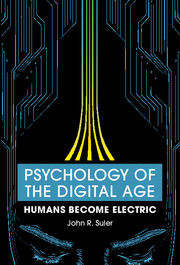Book contents
- Frontmatter
- Dedication
- Contents
- List of Figures
- Foreword
- Preface
- Acknowledgments
- Introduction: Newborns in Evolution
- 1 Cyberpsychology Architecture
- 2 Presence: Be Here Now
- 3 The Dynamic Digital Psyche
- 4 The Disinhibited Self
- 5 Electrified Relationships
- 6 Other Than You Think: Interpersonal Perceptions
- 7 Text Talk
- 8 Image Talk
- 9 I, Avatar
- 10 One of Us: Groups and Communities
- 11 Change and Excess
- 12 Addicted or Devoted
- 13 The Digital Deviant
- 14 Synthesized Realities and Synthesized Beings
- 15 Electric Th erapeutics
- Conclusion: Research and the Researcher
- References
- Index
6 - Other Than You Think: Interpersonal Perceptions
Published online by Cambridge University Press: 05 November 2015
- Frontmatter
- Dedication
- Contents
- List of Figures
- Foreword
- Preface
- Acknowledgments
- Introduction: Newborns in Evolution
- 1 Cyberpsychology Architecture
- 2 Presence: Be Here Now
- 3 The Dynamic Digital Psyche
- 4 The Disinhibited Self
- 5 Electrified Relationships
- 6 Other Than You Think: Interpersonal Perceptions
- 7 Text Talk
- 8 Image Talk
- 9 I, Avatar
- 10 One of Us: Groups and Communities
- 11 Change and Excess
- 12 Addicted or Devoted
- 13 The Digital Deviant
- 14 Synthesized Realities and Synthesized Beings
- 15 Electric Th erapeutics
- Conclusion: Research and the Researcher
- References
- Index
Summary
The single biggest problem in communication is the illusion that it has taken place.
– George Bernard ShawShortly after I published an article online about the psychology of body language, I received an email from a man who expressed an interest in the topic. Given the generic username in the email address and his not indicating anything about himself, I had no idea who he was. He asked if I would watch a YouTube video in which journalists interviewed the Apollo 11 astronauts who had returned from the first moon landing. He wanted to know what I thought of their “strange” body language. Curious, I clicked the link he provided and viewed the video. The astronauts appeared a bit uncomfortable, but more interesting to me was the discussion that ensued among the other visitors to the page. Many of them firmly believed in the conspiracy theory about the first lunar landing, how it never actually happened but was instead staged by the U.S. government. Many of them agreed that the astronauts looked very guarded, that they were clearly lying. In my email to the man who had contacted me, I stated that the astronauts appeared a bit nervous, perhaps due to the fact that they were not used to being in the media spotlight. Here is what he said in his email reply:
oh PLEASE! … Nervous. These are men that are from highly specialized backgrounds, and with high influence, at least one was a 33 degree mason. They would be used to TV. It goes much deeper than what you suggest, which is reflected in their body language.
No, what you mean is, you refuse to “look.” As is very typical with the establishment of psychology, you jump at the chance at labeling the “little person,” but HIDE when asked to expose the body language of those part of the power structures and its propaganda…. See?? – i can read you like a book.
MOM, DAD, MACHINE
To begin this second chapter devoted to the social dimension of cyberpsychology architecture, let's try a quick exercise. Think about your spouse, a romantic relationship, or a close friend. Focus on some important characteristic of that individual's personality – a characteristic or trait of that person to which you have a strong emotional reaction, positive or negative.
- Type
- Chapter
- Information
- Psychology of the Digital AgeHumans Become Electric, pp. 127 - 157Publisher: Cambridge University PressPrint publication year: 2015



